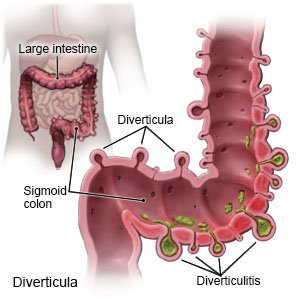Diverticulitis
Medically reviewed by Drugs.com. Last updated on Sep 23, 2025.
AMBULATORY CARE:
Diverticulitis
is a condition that causes small pockets along your intestine called diverticula to become inflamed or infected. This is caused by hard bowel movement, food, or bacteria that get stuck in the pockets.
 |
Signs and symptoms include the following:
- Pain in the lower left side of your abdomen
- Fever and chills
- Nausea or vomiting
- Constipation or diarrhea
- An urge to urinate or have a bowel movement more often than usual
- Bloody bowel movements
- Bloating and gas
Seek care immediately if:
- You have bowel movement or foul-smelling discharge leaking from your vagina or in your urine.
- You have severe diarrhea.
- You urinate less than usual or not at all.
- You are not able to have a bowel movement.
- You cannot stop vomiting.
- You have cramps or severe abdominal pain and a fever.
- You have new or increased blood in your bowel movements.
Related medications
Call your doctor if:
- You have pain when you urinate.
- Your symptoms get worse or do not go away.
- You have questions or concerns about your condition or care.
Treatment:
Mild diverticulitis can be treated at home. You may need to rest and follow a clear liquid diet until your diverticulitis gets better. You will be admitted to the hospital if you have severe diverticulitis. You may need any of the following:
- Antibiotics help treat or prevent a bacterial infection.
- Prescription pain medicine may be given. Ask your healthcare provider how to take this medicine safely. Some prescription pain medicines contain acetaminophen. Do not take other medicines that contain acetaminophen without talking to your healthcare provider. Too much acetaminophen may cause liver damage. Prescription pain medicine may cause constipation. Ask your healthcare provider how to prevent or treat constipation.
- An IV may be used to give you liquids and nutrition. You may not be able to eat or drink anything until your healthcare provider says it is okay.
- Drainage may be done to reduce inflammation or treat infection. Your healthcare provider may insert a small tube through an incision in your abdomen to drain pus from infected diverticula.
- Surgery may be needed if there is a hole in your bowel or a large amount of swelling. A healthcare provider will remove the infected or inflamed areas of your colon.
Treatment options
The following list of medications are related to or used in the treatment of this condition.
Clear liquid diet:
A clear liquid diet includes any liquids that you can see through. Examples include water, ginger-ale, cranberry or apple juice, frozen fruit ice, or broth. Stay on a clear liquid diet until your symptoms are gone, or as directed.
Follow up with your doctor as directed:
You may need to return for a colonoscopy. When your symptoms are gone, you may need a low-fat, high-fiber diet to prevent diverticulitis from developing again. Your healthcare provider or dietitian can help you create meal plans. Write down your questions so you remember to ask them during your visits.
© Copyright Merative 2025 Information is for End User's use only and may not be sold, redistributed or otherwise used for commercial purposes.
The above information is an educational aid only. It is not intended as medical advice for individual conditions or treatments. Talk to your doctor, nurse or pharmacist before following any medical regimen to see if it is safe and effective for you.
Learn more about Diverticulitis
Treatment options
- Medications for Diverticulitis
- Medications for Diverticulitis with Hemorrhage
- Medications for Gastrointestinal Diverticula
- Medications for Gastrointestinal Diverticula with Hemorrhage
Care guides
Further information
Always consult your healthcare provider to ensure the information displayed on this page applies to your personal circumstances.
